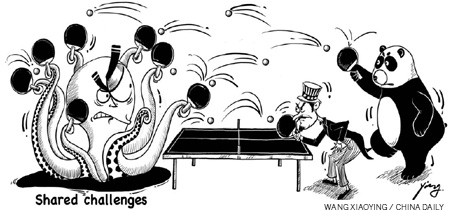View
China, US as strategic collaborators
By Thomas P.M. Barnett (China Daily)
Updated: 2010-12-09 08:01
 |
Large Medium Small |
The word "war" has been appearing increasingly in American debates about China, with the range of potential venues expanding with each new "intractable" issue that arises. Pile enough of these wooden scenarios atop one another, and eventually someone will strike the match. There will always be self-interested parties eager for confrontation, even though the two countries' peoples seek nothing but peaceful coexistence.
Today we share a world more prosperous and more at peace than at any time in human history, so why are we on this undesirable path? Besides the Cold War and the legacy issues retained to this day (Taiwan, the Democratic People's Republic of Korea), there is no historical enmity between our peoples. Since neither situation logically triggers direct military conflict, all of our potential conflicts must be recognized as wars of choice.
An objective examination of globalization's current state and future evolution reveals far more complimentary interests than conflicting ones. As the global financial crisis revealed, China and the United States face shared dangers that must be eliminated - whether we welcome this joint responsibility or not. Neither side's political system presents an ideological threat to the other. Each country's internal structural challenges are its own business or choice, and each will force evolution at a pace its society can handle or demands. Despite these current rumblings, let me tell you why strategic collaboration between China and the US is essential.
In the business world, companies seek partnerships when the proposed relationship is:
Critical to a core goal of the enterprise;
To exploit a core competency;
To effectively counter a competitive threat;
To provide flexibility regarding future choices; and
To reduces a significant risk.
The US' grand strategy for the past seven decades has been to create the globalization we know today. Our firm belief being that the world is a better and more prosperous place when everybody has an "open door" on trade and investment. This is how the United States of America truly united.
Starting with Deng Xiaoping's historic reform, China integrated its economy with that of the rest of the world, marking the tipping point between an international liberal trade order built on the West and finding completion with the "rest".
But China's participation comes at the cost of a dangerous resource dependency far greater than the US has known. Over time, China's economy will depend ever more on energy and minerals. For now, the US essentially covers that security risk through its global policing role, but that effort is unsustainable. For China to succeed in its core goal of creating a well-off society, globalization must be simultaneously advanced and stabilized.
Sino-US strategic collaboration plays to each nation's current core competencies. China does not have a military with global reach, but the US has one now and it is deeply experienced. Yet the US forces struggle with nation building, while Chinese multinationals clearly excel at creating infrastructure, markets and opportunities for income growth in developing economies. China is also a major contributor of peacekeeping troops to the United Nations.
Today, as the primary face of globalization, the US is targeted by virtually every threat mounted by the enemies of global integration and economic modernization. China has already surpassed the US as globalization's primary integrating force - and inevitably its face too. Irrespective of China's intent, it will become the main target of violent extremists bent on keeping globalization at bay. Today the "long war" belongs to the US; tomorrow it will burden China.
For years I have written of Washington's need to "lock in China at today's prices", meaning the cost of China's cooperation would rise with time. Back then I believed that, without such cooperation, the US' strategic choices would narrow considerably.
That day has arrived, meaning the choice is now China's: lock in US cooperation in safeguarding China's vital global export and supply lines or watch your own strategic choices narrow. Imagine a Middle East regional war years from now that the US chooses not to manage because it's primarily China's energy that's at risk. That burden will be devastating for China.
Thus, Sino-US collaboration on stabilizing less-developed regions mitigates significant strategic risk to both nations. Globalization, buttressed by Sino-US strategic cooperation, cannot possibly fail. But globalization, when divided in spheres of influence, dissolves into zero-sum contests where humanity is the ultimate loser.
About such danger, our collective past speaks clearly to our shared future.
The author is the chief analyst of Wikistrat, an Israeli startup company that offers strategy consulting, and has several books, including Great Powers: America and the World After Bush, to his credit.
